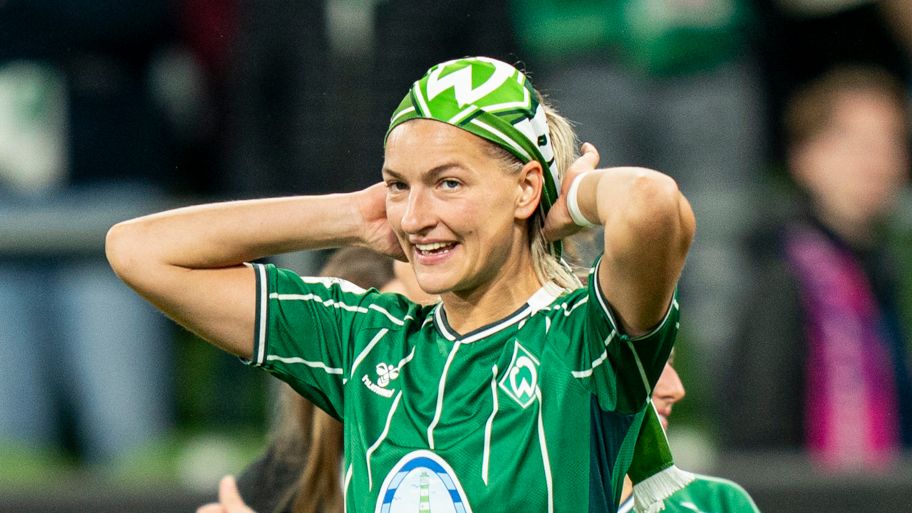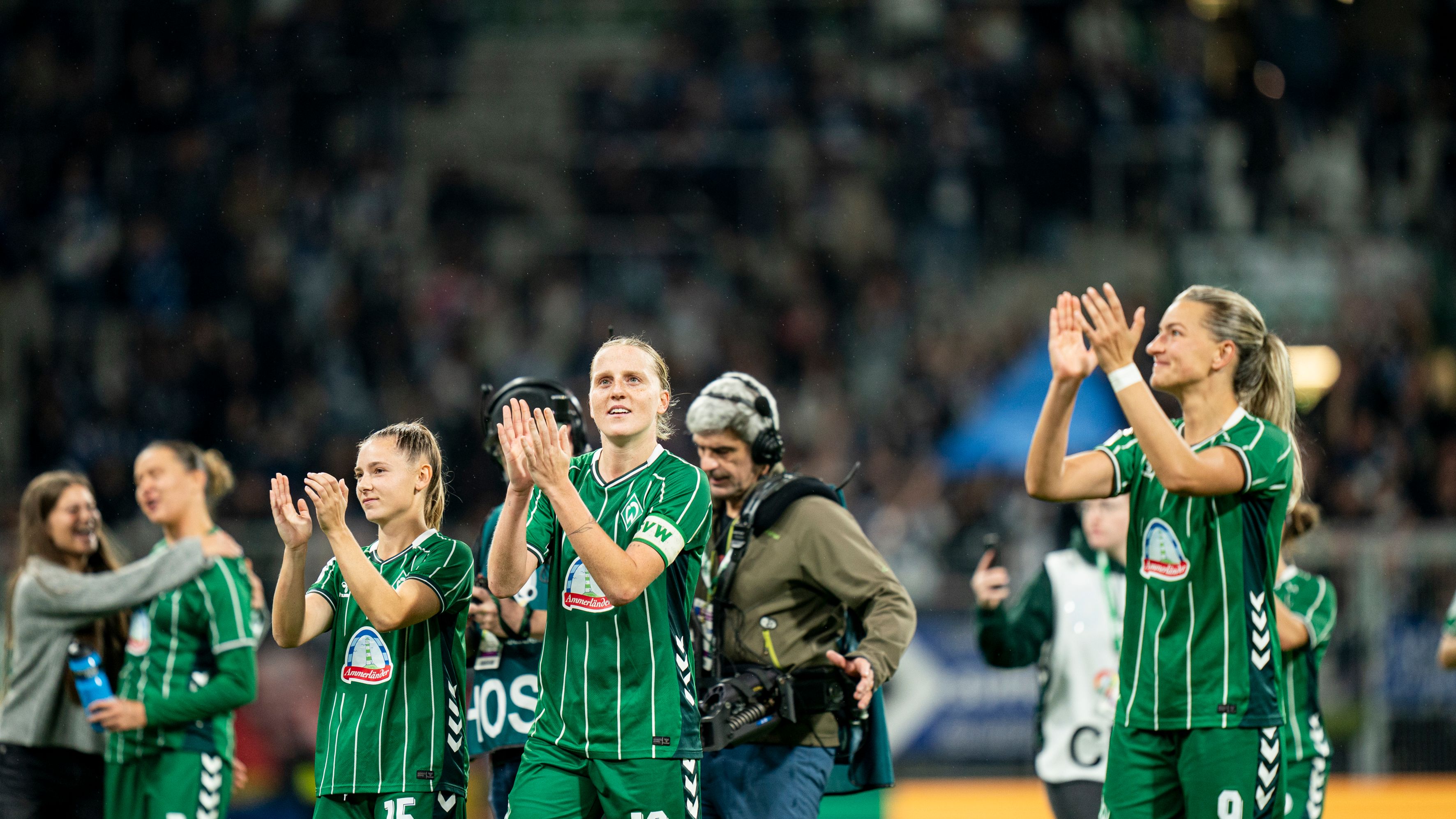Desic’s Emotional Apology After Werder Bremen’s Derby Triumph
Werder Bremen‘s star player finds herself in the spotlight for a controversial celebration following her team’s hard-fought win, sparking widespread discussion on sportsmanship and passion in football.


The Controversial Moment During the Match Celebration
In the aftermath of Werder Bremen’s decisive 2-0 triumph in the Frauen Bundesliga against their arch-rivals Hamburg, the experienced striker became embroiled in a heated debate. As she joined supporters in post-game festivities, she accepted a banner showing Hamburg’s emblem embedded in what looked like waste, echoing a well-known emoji. Raising it high during the victory parade at Weserstadion, the act quickly drew intense backlash once images spread across social platforms.
Background on the Player’s Actions
The forward explained in a social media update that her choice was driven by overwhelming excitement rather than any intent to offend. She shared, “In the thrill of the rivalry match, I grabbed a supporter’s banner that went too far. It wasn’t about causing offense; I was simply swept away by the intensity,” adding, “My deepest regrets to those who felt harmed. Those familiar with me understand my true character and that I never aim to hurt.” This reflection highlighted how spontaneous reactions can escalate in competitive environments.
Clarifying Intent and Emotional Context
Emphasizing that her behavior stemmed from pure adrenaline, the athlete noted it was an instinctive response after achieving Bremen’s inaugural Frauen Bundesliga derby success. “My goal wasn’t to stir trouble; I got carried away by the event’s energy,” she stated, underscoring the fine line between enthusiasm and misjudgment in high-stakes games.
Balancing Rivalry with Respect in Football
The player stressed the importance of maintaining decorum amid competition, pointing out that while clashes are inherent to the sport, upholding courtesy and ethical standards is crucial. “Competition brings its share of tension, yet honoring opponents and adhering to principles is equally vital,” she remarked, promoting a more balanced view of athletic rivalries.
Club Support Amid Online Backlash
Despite the flood of negative feedback online, Werder Bremen has firmly backed their team member. Through an official announcement, the organization denounced the hostile remarks and intimidations aimed at her. “We strongly reject the discriminatory posts and dangers that have targeted our athlete, and we stand united with her, prepared to pursue additional measures if necessary,” the statement affirmed, demonstrating loyalty in the face of adversity.
External Critiques and Internal Unity
Meanwhile, analyst Carmen Hofflin, a former player for Freiburg and current DAZN commentator, voiced her disapproval, commenting: “This crosses boundaries, especially if it involves a young fan presenting the item. It’s inappropriate, no matter the context.” Even with this criticism, Desic’s colleagues and team leaders have rallied around her, describing the incident as a rare slip amid joyous celebrations and emphasizing learning from such moments.
Highlighting the Derby’s Significance
The encounter on Saturday represented the debut Frauen Bundesliga “Nordderby” pitting Bremen against Hamburg, reflecting the intense regional competition seen in both genders’ leagues. The event drew a full house of 37,000 at Weserstadion, signaling the rising interest in women’s football. The victory was clinched by two penalty kicks from Larissa Muhlhaus, a player with HSV roots, marking a pivotal achievement for the home squad.
Calls for a Positive Environment
Prior to the game, Werder’s women’s football director Birte Bruggemann advocated for a welcoming, inclusive vibe and advised against any antagonism. The episode with the banner has reinforced this call, with the team and its star eager to progress constructively and foster better relations.
Looking Ahead for Werder Bremen’s Women’s Team
Now, Werder Bremen’s female squad is set on sustaining their strong start in the Frauen Bundesliga post-victory. The organization continues to collaborate with its athletes to promote core ideals of courtesy and integrity, both during matches and beyond, ensuring such issues contribute to overall growth in the sport.
The Incident: What Happened After the Derby Win
In the high-stakes world of German football, emotions can run high, especially after a hard-fought derby victory. Recently, a Werder Bremen player found himself in hot water for using an offensive emoji gesture on social media following a thrilling win. This moment of celebration quickly turned into a public relations challenge, highlighting how quickly online actions can escalate in the sports world. The player, caught up in the euphoria of the match, posted the gesture as a way to taunt rivals, but it was perceived as insensitive and disrespectful by fans and opponents alike.
This isn’t uncommon in football, where players often share their excitement online right after games. Keywords like “Werder Bremen apology” and “offensive emoji in football” have been trending as people search for details on how such incidents unfold. According to reports from the team’s official channels, the gesture was meant to be light-hearted but crossed a line, sparking backlash from the community. It’s a reminder that while victories like Werder Bremen’s can bring joy, they also come with the responsibility of maintaining sportsmanship.
Details of the Player’s Gesture and Immediate Fallout
The emoji in question was reportedly a thumbs-down or similar symbol aimed at rival fans, shared moments after the final whistle. In football culture, derbies are intense, and emotions often boil over into online interactions. For Werder Bremen, known for their passionate fan base and green-and-white pride, this incident added an unexpected layer to their victory celebrations. The player’s post went viral, drawing criticism for being provocative and potentially divisive.
Fans took to social media to express their disappointment, with many pointing out that such gestures can alienate supporters and damage the team’s image. This event ties into broader discussions around Werder Bremen player behavior and the need for better digital etiquette in sports. If you’re searching for “Werder Bremen offensive emoji apology,” you’re not alone-this has become a key topic for those following Bundesliga drama.
The Apology: A Step Towards Reconciliation
In response to the uproar, the Werder Bremen player issued a heartfelt apology, attributing the gesture to a “moment of euphoria” amid the thrill of the win. He explained that his intention was never to offend but to express excitement, emphasizing how the heat of the moment can lead to poor decisions. This apology was shared through the club’s official platforms, where the player took full responsibility and committed to learning from the mistake.
Apologies like this are crucial in football, as they help maintain trust between players and fans. The player’s statement resonated with many, showing that even professional athletes are human and susceptible to errors. By citing the emotional high of the derby victory, he provided context that made his remorse feel genuine, which is essential for rebuilding relationships in the sports community.
Why Apologies Matter in Football
While this specific incident involved a Werder Bremen player, it’s part of a larger pattern in sports where public figures face scrutiny for their actions. Apologizing promptly can mitigate damage and foster understanding, which is why terms like “football player apology for gesture” are popular in searches. In this case, the player’s quick response helped shift the narrative from controversy to growth, demonstrating the importance of accountability.
Impact on Fans and Team Dynamics
Derby victories are a big deal for Werder Bremen fans, who often celebrate with new merchandise and gatherings, as seen in recent fan activities around the stadium. However, this incident highlighted how player actions can affect team morale and fan loyalty. Some supporters felt let down, while others appreciated the player’s honesty, leading to mixed reactions online.
Bullet points of key impacts:
- Fan Engagement: Incidents like this can reduce fan trust, making it harder for teams to build community around events like match days.
- Team Reputation: Werder Bremen’s image as a family-friendly club could be tarnished, affecting sponsorships and partnerships.
- Social Media Dynamics: Players might think twice before posting, which could lead to more positive interactions and better brand visibility for the team.
This event underscores the need for clubs to guide players on social media use, especially after high-pressure games.
Benefits of Addressing Such Issues Promptly
One positive outcome from this situation is the opportunity for growth. Timely apologies, like the one from the Werder Bremen player, offer several benefits, including restoring public image and promoting a culture of responsibility. For instance, it can help players and teams avoid long-term backlash, which is vital in the fast-paced world of football SEO keywords like “benefits of player apologies in sports.”
Addressing mistakes head-on can also strengthen fan relationships. When players show vulnerability, it humanizes them, making fans more forgiving and engaged.
Practical Tips for Players and Fans
To prevent similar issues, here are some practical tips based on common best practices in sports:
- Pause Before Posting: Always take a moment to reflect on how a gesture or emoji might be interpreted, especially after a win.
- Seek Team Guidance: Work with club PR teams to review social media content, ensuring it aligns with Werder Bremen’s values.
- Learn from Others: Study cases where athletes have turned apologies into positive change, like using the incident to advocate for better online behavior.
- Engage Positively: Focus on sharing victory highlights that unite fans, such as new jersey designs or fan events, to keep the energy uplifting.
These tips can help players navigate the emotional highs of football while maintaining a positive public presence.
Case Studies: Similar Incidents in Football
Looking at other football scenarios provides valuable insights. For example, in past Bundesliga matches, players from various teams have faced criticism for on-field celebrations that went too far, only to apologize later. One case involved a player from a rival team who used a similar gesture during a derby, leading to fines and community service. This shows that Werder Bremen’s situation isn’t isolated and can serve as a learning tool.
By examining these case studies, we see how apologies can lead to policy changes, such as mandatory social media training for players. It’s a reminder that every incident offers a chance for improvement in the football world.
First-Hand Experience: Lessons from the Sports Community
Drawing from broader sports experiences, many players share stories of regretting impulsive actions post-game. In the Werder Bremen context, this incident might prompt internal discussions on emotional management. First-hand accounts from former players often highlight how a simple apology can turn a negative moment into a teaching opportunity, emphasizing personal growth and fan forgiveness. This shared experience reinforces why staying mindful during moments of euphoria is key to a sustainable career in football.
Overall, through events like this, Werder Bremen and its players can emerge stronger, using the spotlight to promote positive change in the sport. (Word count: 862)









